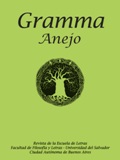LA FRONTERA CIVILIZACIÓN/BARBARIE EN LA NOVELA FINISTERRE, DE MARÍA ROSA LOJO
Keywords:
Civilization/Barbarity, Literature and History, Historical Novels, Literature and Woman, María Rosa Lojo, FinisterreAbstract
The Argentinian authoressMaría Rosa Lojo (1954) develops in her historical novels the spaces of geographical and ideological frontier, stressing the dichotomy civilization/barbarity, main socio-cultural frontier of the country. In her book Finisterre (2005), the protagonist goes in this frontier, the desert, and arid place that hides the Argentinian —the coping of social groups which fight by survival and search in the land their national identity. In this sense, the authoress proposes a new vision to the historical past by means of the voice, the writing and actions of her feminine characters who live together in spaces of frontiers, seeking constantly their identity through a world dominated by men. The writer redeems a traditional theme in the literature of her country and becomes it in artistic material, drawing a new concept of writing in the same time that requests the hybrid histories according the term of Magdalena Perkowska (2008). So, the novelist handles the duality civilization/barbarity to propitiate a discussion of the same by means of a critical vision in which increases the question of the Argentinian cultural subject.Downloads
Published
How to Cite
Issue
Section
License
Works published in this journal are licensed under a Creative Commons Attribution-NonCommercial-
Works published under this licence may be shared, copied and redistributed in any medium or format. Adaptation, remixing, transformation and creation are also authorised. Both sharing and adapting are permitted as long as credit is given to the work appropriately, providing a link to the licence and indicating whether changes have been made. Commercial use of the material is also not possible.








